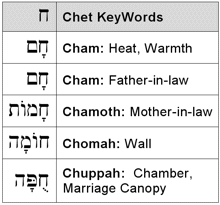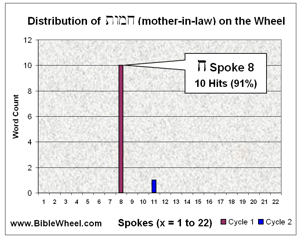Ruth: The Undying Bond
And Ruth said, Intreat me not to leave thee, or to return from following after thee: for
whither thou goest, I will go; and where thou lodgest, I will lodge: thy people shall be my people,
and thy God my God: Where thou diest, will I die, and there will I be buried: the LORD do so to me,
and more also, if ought but death part thee and me.
Ruth 1:16ff (Spoke 8, Cycle 1)
 If
any Book displays the symbolic power of its corresponding Hebrew Letter, it is the little Book of Ruth. She
declared her bond to her mother-in-law Naomi in terms of home, community, church, and death. It would be hard
to find a stronger statement of devotion in the Bible. The central KeyWord that runs throughout the story is
chamoth (mother-in-law). God restricted it almost entirely to the Eighth Book,
which contains all but one of its eleven occurrences in Scripture (see graph below). Its masculine form – cham (father-in-law) –
is identical to the word for heat or warmth. Both are closely related to
chomah (wall), which is spelt with the same primary consonants Chet and Mem in the
same order. All these ideas combine to show that the "in-laws" – the extended family – are supposed to be
a protecting wall that keeps the young married couple warm and safe in this cold cruel world. If
any Book displays the symbolic power of its corresponding Hebrew Letter, it is the little Book of Ruth. She
declared her bond to her mother-in-law Naomi in terms of home, community, church, and death. It would be hard
to find a stronger statement of devotion in the Bible. The central KeyWord that runs throughout the story is
chamoth (mother-in-law). God restricted it almost entirely to the Eighth Book,
which contains all but one of its eleven occurrences in Scripture (see graph below). Its masculine form – cham (father-in-law) –
is identical to the word for heat or warmth. Both are closely related to
chomah (wall), which is spelt with the same primary consonants Chet and Mem in the
same order. All these ideas combine to show that the "in-laws" – the extended family – are supposed to be
a protecting wall that keeps the young married couple warm and safe in this cold cruel world.
 A similar analysis applies to another fundamental familial relation; ach (brother).
This word describes one of the strongest human bonds. Dr. Seekins interprets it, as do I, as
a Hebrew Word Picture
of the strong (Aleph) fence (Chet).
Brothers band together to increase their strength and to protect each other. God used this word in
Amos on Cycle 2 when He accused Tyrus of violating the brotherly covenant (b'rit achim, Amos 1:9).
Ruth is generally considered one of the most delightful and pleasing stories in the Bible.
It is set in the rural agricultural town of Bethlehem at the time of the barley and wheat harvest.
Famine had come to the land of Moab and all three women, Naomi and her two daughters-in-law Orpah and Ruth,
had been widowed. When they heard God had given bread in Bethlehem (House of Bread, BW book pg 135),
they arose to go to the land of Elimelech, the dead husband of Naomi and father-in-law of Orpah and Ruth.
It was then that Naomi urged them to return to the house of their biological mothers. Orpah agreed and Ruth refused,
choosing instead the people and faith of the Hebrews. The story begins in earnest when Ruth goes to glean the
fields, following the reapers who, in obedience to the Torah (Lev 19:9), left the "corners of the field"
untouched so the poor of land could find sustenance. It was then that her close kinsman, Boaz, noticed
her as an unusually virtuous (Chet KeyWord cheyl) woman:
A similar analysis applies to another fundamental familial relation; ach (brother).
This word describes one of the strongest human bonds. Dr. Seekins interprets it, as do I, as
a Hebrew Word Picture
of the strong (Aleph) fence (Chet).
Brothers band together to increase their strength and to protect each other. God used this word in
Amos on Cycle 2 when He accused Tyrus of violating the brotherly covenant (b'rit achim, Amos 1:9).
Ruth is generally considered one of the most delightful and pleasing stories in the Bible.
It is set in the rural agricultural town of Bethlehem at the time of the barley and wheat harvest.
Famine had come to the land of Moab and all three women, Naomi and her two daughters-in-law Orpah and Ruth,
had been widowed. When they heard God had given bread in Bethlehem (House of Bread, BW book pg 135),
they arose to go to the land of Elimelech, the dead husband of Naomi and father-in-law of Orpah and Ruth.
It was then that Naomi urged them to return to the house of their biological mothers. Orpah agreed and Ruth refused,
choosing instead the people and faith of the Hebrews. The story begins in earnest when Ruth goes to glean the
fields, following the reapers who, in obedience to the Torah (Lev 19:9), left the "corners of the field"
untouched so the poor of land could find sustenance. It was then that her close kinsman, Boaz, noticed
her as an unusually virtuous (Chet KeyWord cheyl) woman:
And Boaz answered and said unto her, It hath fully been shewed me, all that thou hast done unto thy
mother in law (chamoth) since the death of thine husband: and how thou hast left thy father
and thy mother, and the land of thy nativity, and art come unto a people which thou knewest not heretofore.
The LORD recompense thy work, and a full reward be given thee of the LORD God of Israel,
under whose wings (kanaph) thou art come to trust (chasah).
Then she said, Let me find favour (chen) in thy sight, my lord; for that thou hast comforted
me, and for that thou hast spoken friendly unto thine handmaid, though I be not like
unto one of thine handmaidens.
Ruth 2:11ff (Spoke 8, Cycle 1)
This passage uses the Kaph KeyWord wing (kanaph) that expresses the idea of an over-arching
protective covering (Spoke 11, BW book pg 242).
It appears again when Boaz covered her with his "skirt" (vs 3:9) in anticipation of the
redemption he would soon purchase for her. God used these words together in one of the most
famous Psalms, "under his wings (kanaph) shalt thou trust (chasah)" (Ps 91:4).
Ruth's mother-in-law burst forth with joy when she saw the hope of finding favour in the eyes of
their kinsman-redeemer:
And Naomi said unto her daughter in law, Blessed be he of the LORD, who hath not
left off his kindness (chesed) to the living and to the dead.
And Naomi said unto her, The man is near of kin unto us, one of our next kinsmen.
Ruth 2:20f (Spoke 8, Cycle 1)
The story ends with Boaz purchasing all that was Elimelech's, including Ruth to be his wife:
And Boaz said unto the elders, and unto all the people, Ye are witnesses this day,
that I have bought all that was Elimelech’s, and all that was Chilion’s and Mahlon’s,
of the hand of Naomi. Moreover Ruth the Moabitess, the wife of Mahlon, have I purchased to be my wife,
to raise up the name of the dead upon his inheritance, that the name of the dead be not cut off from
among his brethren (ach), and from the gate of his place: ... So Boaz took Ruth,
and she was his wife: and when he went in unto her, the LORD gave her conception, and she bare a son.
And the women said unto Naomi, Blessed be the LORD, which hath not left thee this day without
a kinsman, that his name may be famous in Israel. And he shall be unto thee a restorer of
thy life, and a nourisher of thine old age: for thy daughter in law, which loveth thee,
which is better to thee than seven sons, hath born him. And Naomi took the child, and laid it in her
bosom, and became nurse unto it. And the women her neighbours gave it a name, saying, There is a
son born to Naomi; and they called his name Obed: he is the father of Jesse, the father of David.
Ruth 4:9ff (Spoke 8, Cycle 1)
This brings the typology of Book of Ruth into perfect clarity. She was a Gentile who entered
the ancestral blood-line of Christ through faith, just as did the Gentile harlot Rahab
(Spoke 6, BW book pg 203) who became her mother-in-law (chamoth)
when she married Boaz, for he was
born of Rahab (Mat 1:5). And like her mother-in-law Rahab, she represents the Church, made up of
Jews and Gentiles, purchased by our Kinsman Redeemer, the Man Christ Jesus, with His own blood on
the Cross. Oh little town of Bethlehem, from thee our King has come!
Next article: Amos - Fire on the Walls
|



